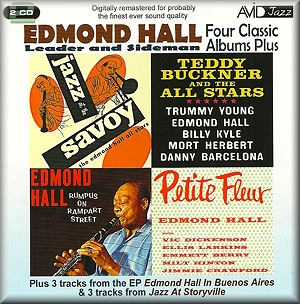CD1
Petite Fleur
1. Petite Fleur
2. Ellington Medley: Prelude To A Kiss/Do Nothing Till You Hear From Me/Solitude/Don't Get Around Much Anymore/Mood Indigo/Take The "A" Train
3. Clarinet Marmalade
4. Edmond Hall Blues
5. Good Cook
6. Off The Road
7. Adam And Evie
8. Don't Give Me Sympathy
Rumpus On Rampart Street
9. Rampart Street
10. Neighbors
11. Rose In Her Window
12. Flyin' High
13. American Tempo
14. Swingin'
15. Hallelujah!
16. Dawn On The Desert
17. Lover
18. African Fu-Fu
Edmond Hall In Buenos Aires
19. Sweet Georgia Brown
20. `S Wonderful
CD2
Teddy Buckner And The All-Stars
1. Jazz Me Blues
2. You Made Me Love You
3. Alexander's Ragtime Band
4. Mahogany Hall Stomp
5. Indiana
6. Bugle Call Rag
7. Careless Love
8. St. Louis Blues
9. Margie
10. Tiger Rag
Jazz At The Savoy
11. Careless Love
12. Please Don't Talk About Me When I'm Gone
13. Bugle Call Rag
14. Medley: Black And Blue/When A Woman Loves A Man/You Made Me Love You/My Ideal/Limehouse Blues
Jazz At Storyville
15. `S Wonderful
16. Sister Kate
17. Ad Lib Blues
Edmond Hall In Buenos Aires
18. Sting On The Wings
"That's Ed Hall". Thus Bing Crosby made many audiences aware of the clarinettist playing with Louis Armstrong's All Stars in the film High Society. Like Louis, Ed Hall was born in New Orleans and played with the sort of commitment that many New Orleans musicians kept throughout their lives. Hall had made himself known to jazz fans by playing in bands led by such musicians as Claude Hopkins, Teddy Wilson and Eddie Condon, and he was even offered a position in the Duke Ellington Orchestra following Barney Bigard. But it was his tenure in the Armstrong All Stars in the 1950s which made him more widely known and appreciated.
Edmond liked to think of himself as a mellifluous clarinettist in the style of Benny Goodman and, indeed, he could play sweetly when he wanted to (as in the understated You Made Me Love You). Yet he often played more forcefully, sometimes reaching an edgy shriek, as he does, for instance, in Alexander's Ragtime Band. These two tracks come from Teddy Buckner and the All Stars, a 1958 album in which trumpeter Teddy Buckner replaced Louis Armstrong as leader of the Armstrong All Stars (something about which Louis was apparently not well pleased). Teddy Buckner was a disciple of Armstrong's, and he even ends Alexander's Ragtime Band with an upward phrase that Louis often used. One constant delight of this session is Billy Kyle's lucid piano.
The LP Petite Fleur dates from the same year and has Ed leading a quartet which is occasionally expanded to a sextet. Of course, the title-track is Sidney Bechet's famous composition which got Chris Barber (with Monty Sunshine) into the pop charts in 1959. Ed Hall jazzes it up slightly more than Monty did. The Duke Ellington medley shows off the skills of trombonist Vic Dickenson, Ed Hall (in a buoyant Do Nothing Till You Hear From Me and a thoughtful Mood Indigo), Emmett Berry, and marvellous pianist Ellis Larkins, whose creative contributions to this whole set are alone worth the price of the album.
The LP Rumpus on Rampart Street was recorded a year later (1959) and puts Ed Hall into a more traditional setting, joined by two other clarinettists - Omer Simeon and Herbert Hall - on four tracks, with Dick Cary on Walleresque piano and Jimmy Crawford providing some invigorating drumming. Several of the tunes were written by Ed and he plays them with feeling - and plenty of vibrato. The tracks with three clarinets avoid shrillness with some harmonious voicings supplied by arranger Eddie Wilcox.
Jazz at the Savoy was recorded a decade earlier - in 1949 - and sounds very like those renowned Vic Dickenson sessions which consolidated the term "mainstream". Dickenson is part of the sextet but the most significant thing about this session was that it signalled the recording debut of 22-year-old Ruby Braff. He makes his mark from the very first track of the LP, Careless Love, which proves that he already had a gift for melodic solos. The recordings come from radio broadcasts from the Savoy Caf‚ in Boston, but the poor quality and interference heard on some tracks doesn't detract from the energy of the session. Pianist Kenny Kersey is particularly notable here. Perhaps the outstanding track is the 12-minute medley which starts with Ed Hall performing an outspoken but poignant Black and Blue; Ruby Braff rhapsodising on When A Woman Loves A Man; Vic Dickenson declaring You Made Me Love You; Kenny Kersey decorating My Ideal; and bassist John Field playing a brief solo before the whole band comes in with a lusty Limehouse Blues featuring drummer Jimmy Crawford in a long solo.
The album is filled out with three tracks from Jazz at Storyville, a 1951 session led by George Wein (playing a rather tinny piano), and three from Edmond Hall in Buenos Aires, a 1957 EP recorded with local musicians.
This album is a bargain at its budget price (around £7), although
I am tired of pointing out the inadequacies of the sleeve-notes in
these Avid compilations. For example, the personnels for Petite
Fleur are unclear, which is why I have not listed the musicians
in detail.
Tony Augarde
